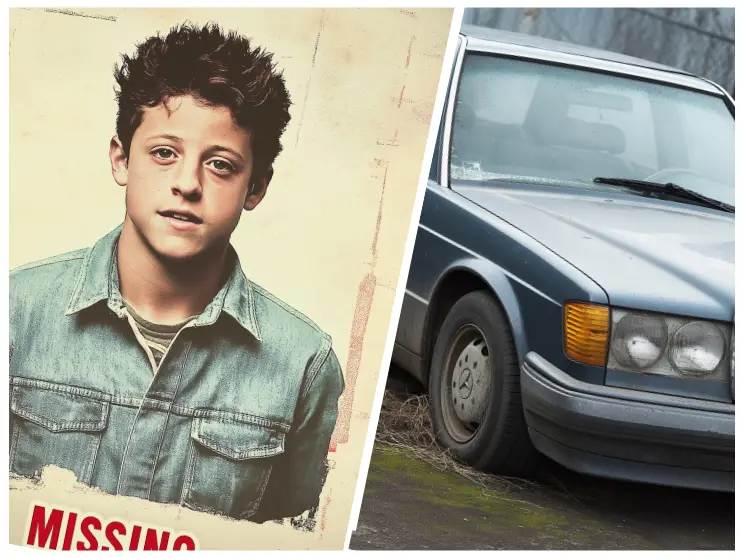The car looked ordinary enough, just another relic from the eighties waiting to be hauled away. But something inside it, something hidden for forty years, would change her life. She didn’t know it yet, as she walked through the auction lot, that the past was quietly parked before her.
Later, when the mechanics began tearing out panels and checking under seats, they’d stumble upon the object. It looked innocent enough, but whispered strangely of secrets left behind. That discovery would pull her, unwillingly, into the unraveling of a mystery everyone else had forgotten.
Her intention had never been to go chasing ghosts. She only wanted a car she could afford. But the 1983 Mercedes-Benz 190E carried more than rust and dust in its frame. It carried the faint, unshakable trace of someone who had vanished without a goodbye in 1985!
The auction hall wasn’t glamorous. It smelled of diesel, floor wax, and too many years of government storage. Rows of vehicles, some battered, some barely used, sat beneath buzzing fluorescent lights. Police impounds, seized property, and surplus cars all found their way here, waiting for new owners.

Margaret blended in with the other bidders, though she wasn’t the usual type. Most were dealers in work boots or retired men looking for bargains. She was in her early forties, hair pulled up in a messy bun, and she was desperate not for a project, but for wheels.
Her eyes stopped on a 1983 Mercedes-Benz 190E, the so-called Baby Benz. The paint was dull, faded to a tired gray-blue, the chrome trim long gone dull. The odometer was a graveyard number, the interior cracked and sun-worn. She groaned inwardly. This was no dream find.

Back in 1993, when she graduated high school, this was the car she’d dreamed of. She remembered the glossy ads in magazines, and how it seemed like luxury shrunk to fit a suburban driveway. But she couldn’t afford it then, and now here it was, decades later, a broken shell.
Margaret’s last car, a twenty-year-old Corolla, had coughed itself to death three weeks earlier. She couldn’t swing a loan, not with her part-time cashier job and rent bleeding her dry. Public buses didn’t reach her late-night shifts. She needed something cheap, even if it looked like scrap.

The bidding started low. No one raised a hand. A car like this meant endless repairs and parts that weren’t cheap. Margaret raised her paddle with trembling fingers, hoping no one else would bother. They didn’t. When the auctioneer banged the gavel, it was hers for less than a month’s wages.
Signing the papers, her stomach sank. She should’ve felt triumph, but instead she felt dread. What if it gave her only endless trouble? What if she’d just wasted money she couldn’t spare? She touched the window of the car, stared at the cracked dash, and whispered, “God, what have I done?”

The smell inside was what she expected: old upholstery, dust, something metallic, and perhaps a faint trace of something else that she couldn’t place—it was an old car after all. The seats were cracked, the radio was missing, and the odometer showed over two hundred thousand miles. But she wanted to believe it had potential.
When she pulled up to the local garage, the Baby Benz sputtered, rattled, and stalled twice. Ken, the shop owner, let out a long whistle. “Lady, this thing’s half rust, half hope.” Margaret flushed, muttering, “It’s all I could afford.” He softened. “Alright. Let’s see what we can do.”

Normally, the surprises during a restoration were mechanical—rust in the wheel wells, bad wiring, maybe a blown head gasket. Margaret expected all of that and more, and dreaded the bill. But when the call came the next day, Ken’s voice wasn’t grim about repairs. It carried a whiff of something stranger.
“We found something in your car,” he said, pausing. “Not a busted part. Something else. You’d better come in and have a look at it yourself.” Margaret’s first thought was drugs or a gun—some leftover from the impound. Her chest tightened. The last thing she needed was the police hauling her in.

Inside, the shop smelled of engine oil and fresh coffee. The car sat on a lift, wheels removed, panels half-open. The owner, Ken, gestured for her to follow. He didn’t say much as he led her past tool benches, toward a small work table where an object lay waiting.
Ken beckoned her over. A small evidence bag sat there. Inside it were a dusty 35mm film canister and a folded note, the paper yellowed, edges curled like old petals. It was not what she had expected, and so she looked at Ken quizzically.
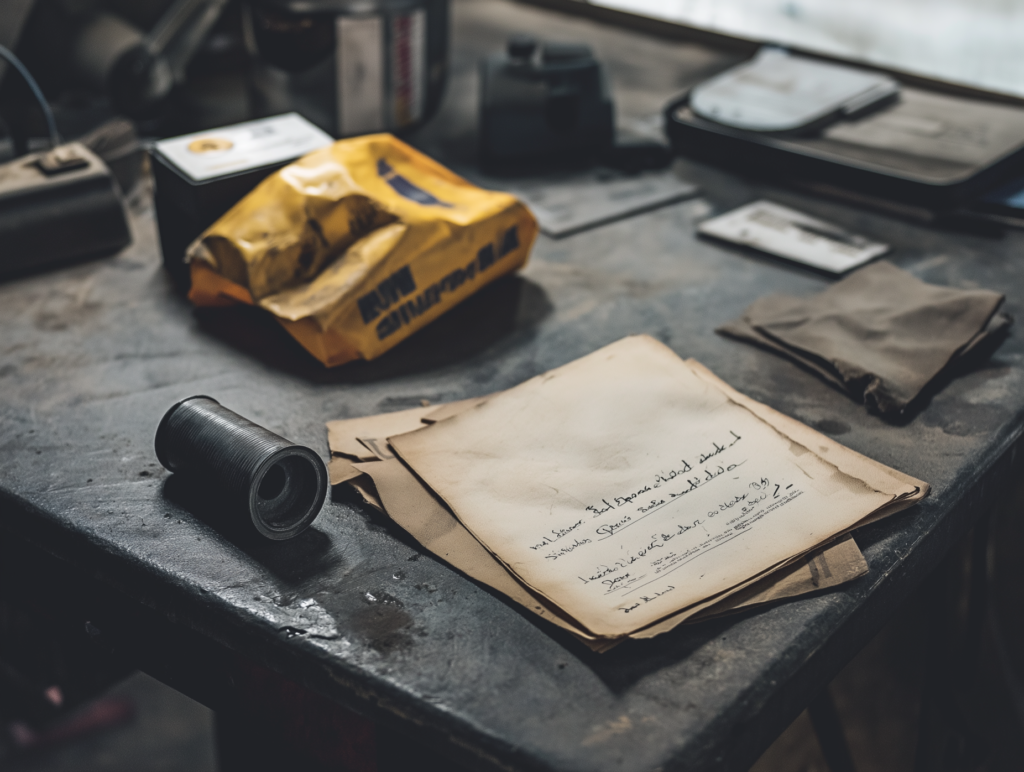
“That was under the back seat,” Ken explained, rubbing his jaw. “Wedged so tight we had to pry it loose. Strange place to leave a film roll. And the note was wrapped around it.” He hesitated. “We didn’t open it. Thought it best you see it first and take a call.”
With trembling hands, Margaret slid the note free. The writing was sharp, hurried. “Leaving soon. Don’t wait up.—D, 03 Mar 1985.” That was all. There was no name or explanation. Just that single line, a whisper left behind for someone who never found it.

Margaret lifted the film canister and the folded note with careful fingers. Ken crossed his arms. “You want me to call this in? Police, maybe? Could be nothing, could be trouble.” Margaret hesitated, then shook her head quickly. “No… no police. I’ll just hang on to it for now.”
She slipped the canister and note into her bag, heart pounding. The sensible thing would be to drop them in a drawer and forget them entirely. But the words on the note kept burning through her thoughts. Why was a note from 1985 still in the car? Was the note and film stash meant for someone specifically? Was it some sort of keepsake?

And so began the strangest adventure of Margaret’s life—one that would take her back in time, on the trail of a person declared missing, into newspaper archives and conversations with people who remembered what others had long buried. All because she bought the only car she could afford at an auction.
The next afternoon, she stood in the little one-hour photo shop two towns over, embarrassed as she slid the dusty roll of film across the counter. The clerk raised an eyebrow. “Been a while since I’ve seen one of these.” Margaret muttered something about cleaning out an old car.

When she picked them up the following day, the photos stopped her cold. They were of a young man, shaggy dark hair and a confident grin, leaning against a gleaming Mercedes-Benz 190E—the very car she had dragged from the auction. Other shots showed him smiling at the wheel. Some were scenic shots of what evidently seemed like a drive up north.
Margaret spread the prints across her kitchen table that night. Most of the photos featured the car. Whoever he was, he’d been proud of that car when it was new. The handwriting on the note suddenly felt heavier, like a voice cut off mid-sentence. Against her better judgment, she opened her laptop and began an image search.

It didn’t take long. Within minutes, the same face stared back at her from grainy scans of old newspapers. “David Armitage, 25, Missing Since March 1985.” Headlines whispered of unanswered questions: No Leads in Armitage Case. Family Appeals for Help. Margaret’s pulse hammered. She was holding the pieces of a vanished life.
She stared at the articles, her pulse quickening. What did it mean? It seemed like he owned the car. Or could it be that someone else had hidden his belongings inside? Her mind spun with possibilities—both dark and mundane. The mystery felt tangible, like dust on her fingers, impossible to ignore.

She dug deeper, clicking through archive links, then drove out to the local library when the free internet clippings ran out. The librarian, Mrs. Hanley, raised an eyebrow when Margaret asked about newspaper records from 1985.
“You’re not the first to come digging about David Armitage,” she said softly. “But it’s been years since anyone asked.” With a sigh, she led Margaret down the narrow staircase into the archive room.

Dust motes floated in the dim light as Mrs. Hanley rolled out a cart of microfilm reels. “The Armitage case rattled this town for months,” she explained. “Some swore he’d been murdered. Others whispered he skipped out on debts. No one really knew. It just…ended.”
Margaret threaded the film into the reader, squinting as headlines flickered across the screen. March 12, 1985: “Young Man Missing After Night Out.” March 20: “Police Expand Search to Riverbanks.” April 3: “No Leads in Armitage Case; Family Pleads…” Each article carried the same hollow uncertainty.

She scoured the internet again until her eyes blurred, but apart from old clippings and half-dead message boards, there wasn’t much. People had speculated endlessly: murder, debts, an affair gone wrong. The theories spiraled into folklore.
In the days that followed, Margaret was like a dog digging for its bone. March 1985 stories mentioned him last seen leaving The Iron Lantern, a bar that no longer existed. He never came home that night.

What struck her most was the timeline. The missing report was filed on March 12, and the note was dated 03 March 1985. It all lined up. David hadn’t simply vanished into thin air. He’d been planning something—a trip, perhaps an escape— long before anyone realized.
His car, a brand-new Mercedes-Benz, remained missing with him. One witness claimed he was arguing with someone. Another said he had talked about “heading north for a while.” The fragments lined up imperfectly, like mismatched tiles.

She jotted notes furiously, circling dates. The timing mattered: the note was dated March 1985. The photos showed the car was brand new. Somewhere around the same time, David Armitage had slipped out of one life and into silence.
His parents stared out from one old article, eyes hollowed by worry, the kind of grief that outlives seasons. A later piece mentioned a surviving sister, Evelyn, only a teenager at the time. Margaret scribbled notes in the margin of her notebook, suddenly aware she was trespassing into another family’s heartbreak.

Part of Margaret wanted to hand the whole bundle to the police and wash her hands of it. She had bills to pay and a life to hold together. Another part of her, the bigger part, couldn’t let go. How did a vanished man’s life end up trapped in her car?
She hesitated for days, the photographs tucked into a manila envelope on her dresser. Every time she passed, the faces seemed to plead with her. At last, she couldn’t stand it. She found the address listed for Evelyn Armitage and drove across town, clutching the envelope like contraband.

The house was modest, peeling paint on the shutters, a porch swing shifting in the wind. Margaret’s knees felt weak as she stepped onto the porch. Margaret stood on the step, envelope in hand, heart hammering like she was back in high school waiting for exam results.
The door opened after her second knock. A woman in her late fifties, silver hair pinned back, studied her with cautious eyes. “Evelyn Armitage?” Margaret asked. The woman nodded slowly. Margaret held out the envelope to her.

“I think these belonged to your brother,” Margaret said. Evelyn’s hand trembled as she pulled out the photographs, breath catching as she traced the image of David leaning against the Mercedes. “Oh God,” she whispered, sinking into a chair.
They sat in silence for a long moment. Evelyn turned the mysterious note over in her hand. “He always wanted to leave,” she said softly. “Said he’d go north someday, to Niagara, maybe Canada. But no one believed him. When he vanished, people whispered worse things. I knew he chose to go.”

She continued, as if talking to herself, “He loved it there. Said it made him feel small, but free. He talked once about crossing over, starting over. I always wondered about him. But I just didn’t see what I could do that the police hadn’t already done.”
“Did he have trouble at home? With money? With the law?” Margaret asked. Evelyn shook her head. “Not the law. Just… expectations. Dad wanted him in the family business. David wanted more. Freedom, I think. He was restless. That car of his? It was everything to him — his ticket out.”

Margaret told her how she’d found the film and note in the car at the government auction. Evelyn sat back, astonished. “His car came back here?” she whispered. “I thought it was lost with him. To imagine, all this time, it was just sitting here, and we had no idea…”
Tears slid down her cheeks. She dabbed them with a tissue, then looked at Margaret firmly. “You’ve given me more than I ever thought I’d have. Perhaps, proof that he left by choice. That’s… something.” She squeezed Margaret’s hand. “But I need to know. Did he make it? Where is he?”

Margaret swallowed hard. “I only came to hand you these.” Evelyn nodded, tears brimming. Then she looked up, her voice steadier. “I’ve lived with questions for forty years. I can’t go chasing answers anymore. But you found these. Maybe you can do what I couldn’t.”
Margaret blinked. “Me?” Evelyn’s lips pressed thin, then curved in the faintest smile. “I can pay you a little. Enough for gas, maybe food. If you’d go across the border, ask questions. Find out what became of David. I need to know if he made it, even if he never came back.”
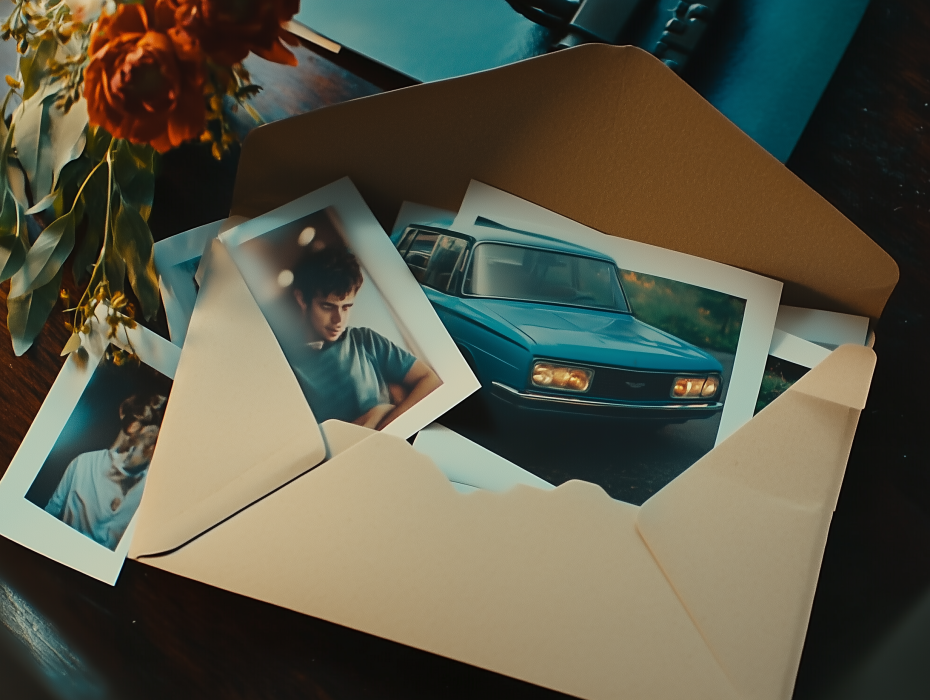
Margaret hesitated, the envelope still open between them. “I’m not a detective,” she said quietly. “I’m barely getting by myself. I just needed a car.” Evelyn’s eyes softened. “All the more reason. You have no agenda, no angle. Just curiosity and maybe enough stubbornness to go farther than I could.”
Evelyn slid a small envelope of cash across the table. “It isn’t much,” she admitted. “But it’ll cover gas and a motel or two. I never stopped setting a little aside—just in case. I’d like it to be used for him. For David. Take the envelope and return it after you have the answers.”
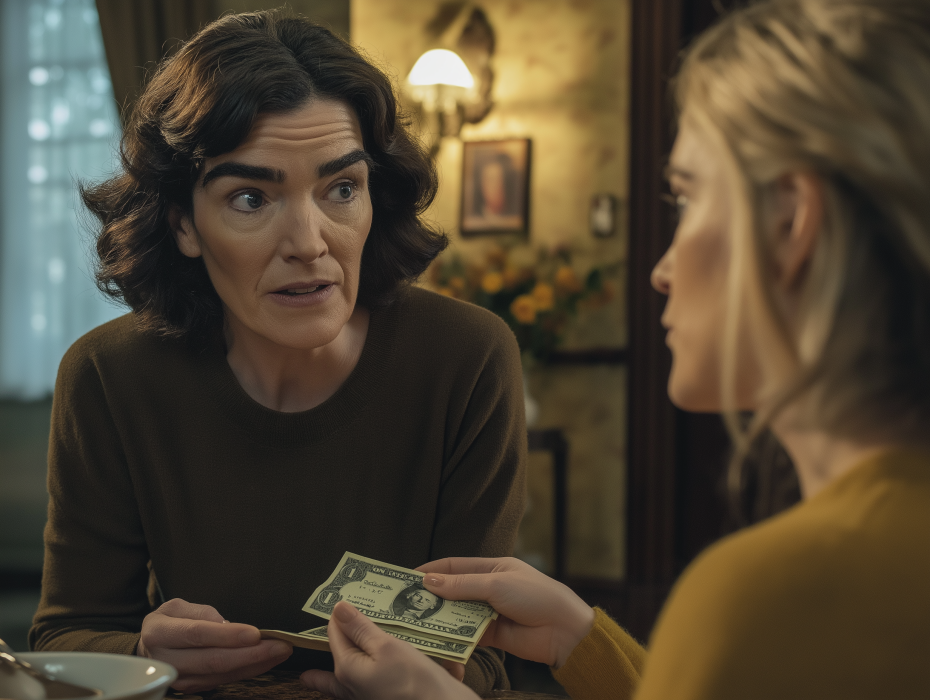
Margaret tucked the money reluctantly into her bag. On the drive home, the weight of the task pressed down on her. She hadn’t expected responsibility, only a broken-down Benz she already half-regretted buying. Yet now she was carrying decades of unanswered questions in her passenger seat.
That night, she laid the photos out again: David leaning on the Baby Benz, David behind the wheel, laughing, David photographed by friends she didn’t know. The note’s words made her skin prickle. Where had he gone? Why had he sent no word?

Walking back up the library steps, Margaret’s nerves fluttered. She had Evelyn’s blessing, a handful of photographs, and a single line of handwriting pointing her north, maybe. But what would she say if she actually found someone who remembered him? Would they welcome the questions or close their doors to her?
She told herself she’d give it a week. Drive as far as Niagara, ask around, check old directories, maybe follow the car’s paper trail. If it led nowhere, she’d come back. But her gut told her this wasn’t the sort of story that ended with empty roads. No one had ever followed the trail north. Margaret realized she might be the first.

Before leaving, she took the Baby Benz for a cautious drive around the block. The engine coughed and rattled, and though its overhauling was far from over, the car moved with surprising steadiness, as if eager to stretch its legs again. Margaret gripped the wheel and whispered, “Alright then, David. Let’s see where you left yourself.”
The questions were rooted deep in Margaret’s mind. Did David cross the border? Did he build another life, under another name? Or did something derail him before he got there? The photos and note gave hints, but not answers. And now, she realized, she couldn’t stop until she found them.

That night, she spread the items across her dining table, arranging them like puzzle pieces. If David had reached Canada, maybe someone there had records. Passenger lists, employment files, something. But how would she track down a man who’d erased himself for forty years? She sipped her tea, considering. The answer wasn’t the police. It wasn’t archives. It might be living people.
Margaret met Ken at the shop the next morning. Her car needed its final touch-ups. “Do you remember if the car had Canadian tags at any point?” He hesitated. “Not when it came to us, no. But sometimes state records are incomplete. If you want to dig, you’ll need a Department of Motorized Vehicles history report. I know a guy.”

That afternoon, she met Ken’s contact, a retired clerk named Howard who enjoyed fishing for gossip as much as trout. He agreed to pull the records “for nostalgia’s sake.” Two days later, he handed her a printout. Her eyes widened: in 1986, the Mercedes had been re-registered in Ontario.
Her pulse quickened. That meant David had crossed the border—at least with the car. Someone, maybe him, had driven it into Canada. But the trail went cold after 1987, when the registration lapsed. Who drove it back? And how did it wind up in government storage decades later?

The questions stacked higher. Yet for the first time, Margaret felt she was closing the distance between present and past. David had made it farther than anyone believed. He hadn’t vanished into thin air. He’d kept going, left traces, however faint. And she intended to follow them.
Evelyn called that evening. Her voice was hopeful, trembling. “Did you find anything? When will you go?” Margaret told her about the Canadian registration. Silence hung for a beat, then Evelyn whispered, “So he really did go. He wasn’t taken from us. He chose it.” Relief, fragile but real, filled her words.

Margaret promised to keep searching. She didn’t know why she felt so responsible, but she did. Perhaps it was the look in Evelyn’s eyes, the relief of a sister who had carried grief too long. Or perhaps it was that photograph of David leaning proudly against the car.
She looked out her window at the night sky. A strange thought came: maybe the Baby Benz had been waiting all these years, carrying David’s secret until someone cared enough to open the secrets. And somehow, that someone had turned out to be her.

The next step was clear. If David had crossed into Canada, there might still be immigration records, old addresses, or even descendants. Margaret had never been one for bold adventures, but suddenly, she was planning a road trip. The envelope, like a compass, pointed her north.
Before bed, she tucked the items back into the envelope and slid it into her bag. She paused, hand resting on it, a strange blend of anticipation and fear fluttering in her chest. Whatever came next, she knew, her life was no longer on its old track.

She was ready to follow the trail, no matter where it led into the quiet corners of archives, the memories of strangers, or the long roads that crossed into another country. Somewhere out there, David’s story waited to be finished.
The shop called eventually, after the final restorations were complete. “She’s roadworthy for long distance,” Ken said. “Not pretty yet, but safe— brakes, fluids, belts, and tires. Bodywork can wait.” Margaret signed the invoice, heart drumming. The Baby Benz idled smoothly, a soft mechanical purr, carrying the unanswered story of David.

Margaret packed the envelope, a thermos of coffee, and the cash Evelyn had given her. At dawn, she steered the Baby Benz toward the border. The highway stretched flat and gray, her hands damp on the wheel. She rehearsed answers to questions no one might even ask.
At the customs booth, an officer in mirrored sunglasses leaned in, glancing over her passport. “Reason for your visit?” Margaret swallowed. “Research… family history, I guess.” He studied her a beat longer, then waved her through. The gate lifted. The car rolled forward, carrying her into a country where David’s trail still lingered.
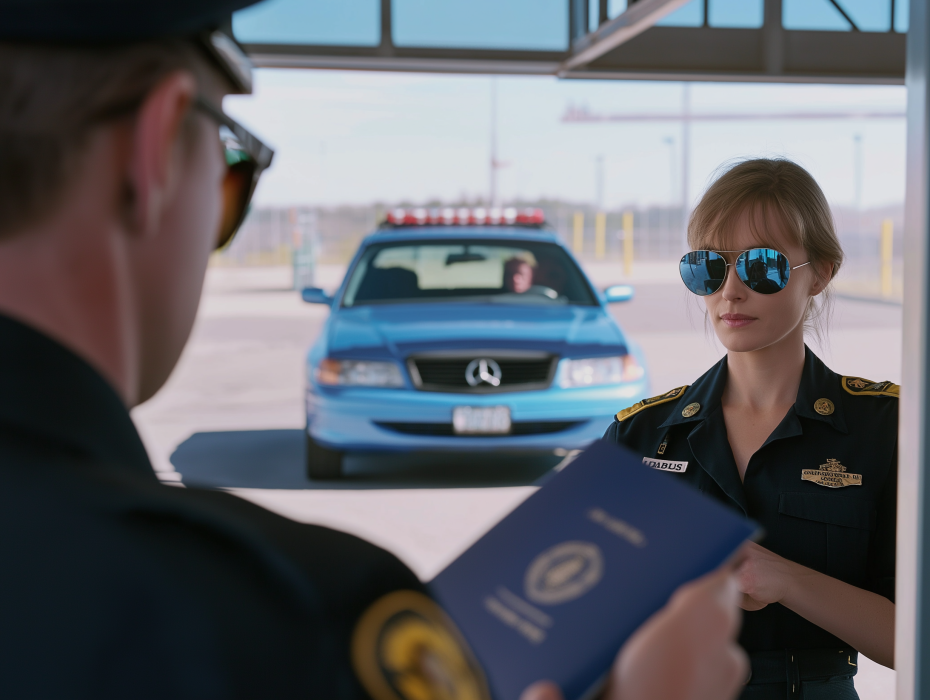
Her first lead was St. Catharines, Ontario. A service decal hidden under the hood bore the name Mapleview Motors and a faded 1986 date. If the car had been serviced there, then perhaps she might find out more about what had become of its original owner. She drove north.
At Mapleview Motors, a white-haired mechanic named Vince studied the Mercedes through the office window. “Well, I’ll be,” he murmured. “That was Dave’s car. He worked here a summer, swept floors, and paid cash for repairs. A good kid. Haven’t thought of him in years.” Margaret’s chest tightened. She leaned closer.
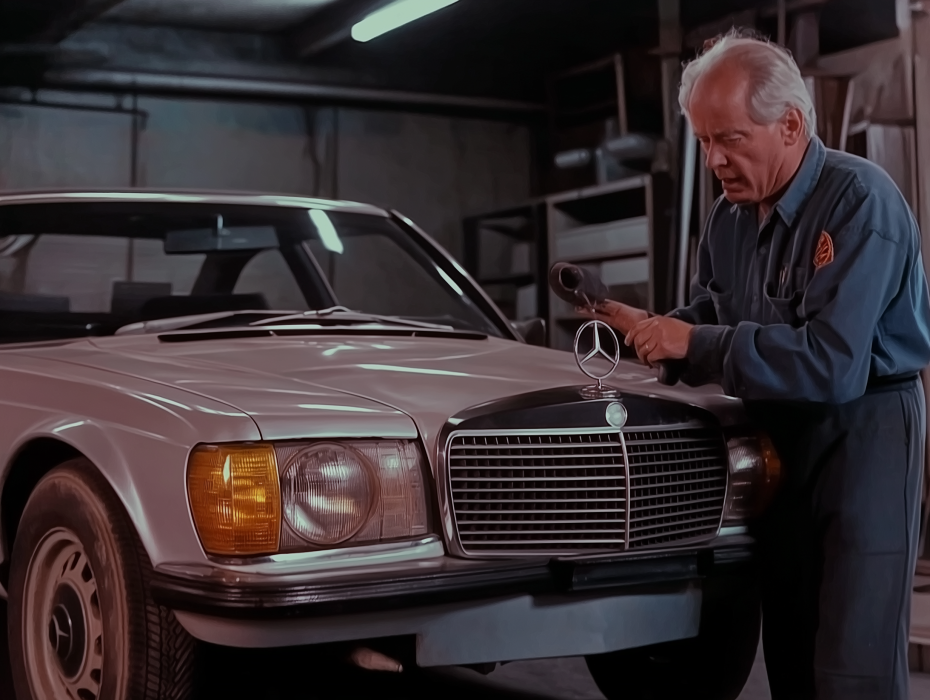
“He went by the name of Dave, never much said about his past. Rented a room above Vicky’s diner. Couldn’t keep that Benz forever, though. He sold it before winter. I think a dealer from Buffalo bought it at auction later. That’s probably how it ended back in your country.”
Two blocks away, Vicky’s Diner smelled of coffee and fried onions. A woman in her seventies, with sharp eyes softened by kindness, nodded when Margaret mentioned the name. “Dave Lake, he called himself. Polite, hard-working. Played guitar at our open-mic nights. He left his mark here, that’s for sure.”

She disappeared briefly, returning with a worn photograph: David at twenty-seven, guitar in hand, smiling toward a small crowd. “He built benches for the community hall. Helped kids fix their bikes. Everyone liked him. Said he couldn’t go back, not while his parents lived. Too much hurt, he felt.”
Margaret asked quietly what became of him. Vicky’s face grew gentle. “He stayed here the rest of his life. Opened a little woodworking shop, taught apprentices. Died about ten years ago, heart trouble. It was peaceful, at home, and with friends around him. We still talk about him like he’s just stepped out.”

The weight of it settled on Margaret’s shoulders, but it wasn’t sorrow alone. There was comfort in knowing his life had ended not in mystery or violence, but in community. “People lit up when he walked in,” Vicky said, eyes shining. “That’s his legacy. He left warmth behind.”
As for the Baby Benz, the trail was simpler now. After selling it in 1986, the Canadian buyer kept it only briefly before reselling it across the border. From there, it passed through dealers, eventually repossessed in the nineties. Forgotten, it fell into government storage until the auction.

Margaret still had many questions. For instance, what about the undeveloped roll of film and the handwritten note? But who could tell now? Probably, David intended to send them to his sister and then backed out, fearing it would be traced back to him. Perhaps, he forgot he had stashed it under the seat when he sold it.
Margaret drove away slowly, the envelope on the seat beside her. The car’s riddle was solved, and thankfully, there was no blood involved, only a man who chose a new life and built something worth remembering. She realized, then, she wasn’t carrying a ghost; she was carrying a legacy, long buried, but now alive again.

Later, Margaret sat once more in Evelyn’s living room, the photograph from Canada on the table. She spoke gently of David’s life there—his work, music, friendships, and peaceful passing. Through the tears, Evelyn’s smile was steady. She whispered, “He lived the life he wanted.” Margaret squeezed her hand, feeling the weight of forty years finally ease into something lighter.
